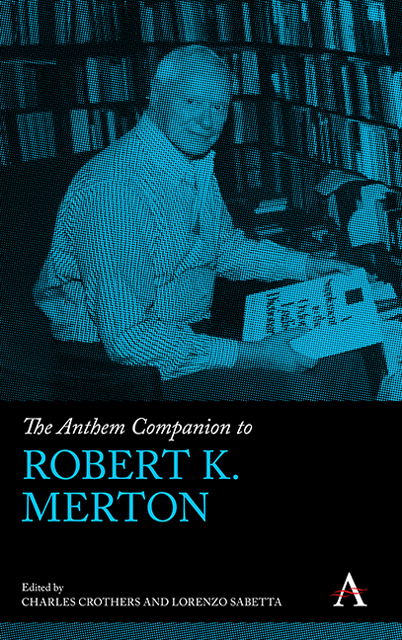Book contents
- Frontmatter
- Dedication
- Contents
- List of Figures and Tables
- Chapter One Introduction: Merton’s Self-Exemplifying Classical Sociological Contributions
- Chapter Two Skeptical Faith, Left Politics, and the Making of Young Robert K. Merton
- Chapter Three Theorist’s Progress: Young Robert K. Merton, 1941–1949
- Chapter Four Taking a Seminar with Merton
- Chapter Five The Development of Mertonian Status-and-Role Theory
- Chapter Six Theory as an Option or Theory as a Must? The Bearing of Methodological Choices on the Role of Sociological Theory
- Chapter Seven “Interviews of a Special Type”: Robert K. Merton and Codification of the Focused Interview
- Chapter Eight Science as a Culture
- Chapter Nine “Providing Puzzles”: Science as Norms and Values
- Chapter Ten A Mertonian Breviary for Cultural Sociologists
- Chapter Eleven The Unpublished Robert K Merton
- Author Biographies
- Index
Chapter Three - Theorist’s Progress: Young Robert K. Merton, 1941–1949
Published online by Cambridge University Press: 10 January 2023
- Frontmatter
- Dedication
- Contents
- List of Figures and Tables
- Chapter One Introduction: Merton’s Self-Exemplifying Classical Sociological Contributions
- Chapter Two Skeptical Faith, Left Politics, and the Making of Young Robert K. Merton
- Chapter Three Theorist’s Progress: Young Robert K. Merton, 1941–1949
- Chapter Four Taking a Seminar with Merton
- Chapter Five The Development of Mertonian Status-and-Role Theory
- Chapter Six Theory as an Option or Theory as a Must? The Bearing of Methodological Choices on the Role of Sociological Theory
- Chapter Seven “Interviews of a Special Type”: Robert K. Merton and Codification of the Focused Interview
- Chapter Eight Science as a Culture
- Chapter Nine “Providing Puzzles”: Science as Norms and Values
- Chapter Ten A Mertonian Breviary for Cultural Sociologists
- Chapter Eleven The Unpublished Robert K Merton
- Author Biographies
- Index
Summary
On January 21, 1941, Theodore Abel of the Columbia University Sociology Department wrote to Robert Merton, then in his second year of teaching at Tulane University, that there was a good chance he would be selected to fill a faculty position. To assure success, Abel needed a statement of current and anticipated researches “in order to combat the opposition which considers you another ‘theoretician’ and would prefer a man like […] Stouffer.” Merton quickly replied that he “judge[d] that I can put my best foot forward by showing that I am not ‘merely’ a ‘theoretician’,” and listed researches including directorship of a 1935 survey of Boston area “transients” for the federal Department of Labor and WPA; participation in a study of employment of graduates of Boston high schools between 1916 and 1939; planned composition of a book on social structure for a series edited by Columbia sociology professor Robert MacIver; and plans for a study of “judicial criminal administration” in New Orleans, as well as a “general book” on the sociology of science.
How do theorists develop? Rarely is there as rich an opportunity to assess this question as with Robert K. Merton. This chapter describes Merton's research, teaching, and theorizing in the 1940s, the period of his career leading up to his recognition as a leading theorist in 1949, the year his Social Theory and Social Structure (Merton 1949b) was published. It is a multifaceted story of experiments, unanticipated opportunities, and some abrupt changes in direction. Young Merton did not blaze any pre-charted path.
The 1941 claim to being not merely a theoretician was not an opportunistic ploy; it accurately characterized Merton's combination of theoretical and empirical work up to that time and as a Columbia professor in the 1940s. Teaching was particularly important, as it was through preparation and evaluation of class presentations that he experimented with a variety of theoretical approaches and critiqued the work of classical and contemporary theorists. There was a strong interest in urban life and city structure that extended into the early 1950s before being abandoned. Although functional theory and analysis were coalescing in these years, Merton stayed on the sidelines.
- Type
- Chapter
- Information
- The Anthem Companion to Robert K. Merton , pp. 51 - 68Publisher: Anthem PressPrint publication year: 2022

